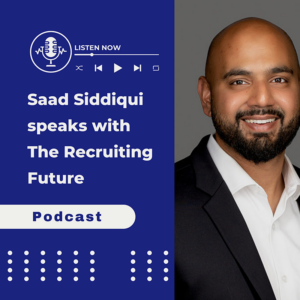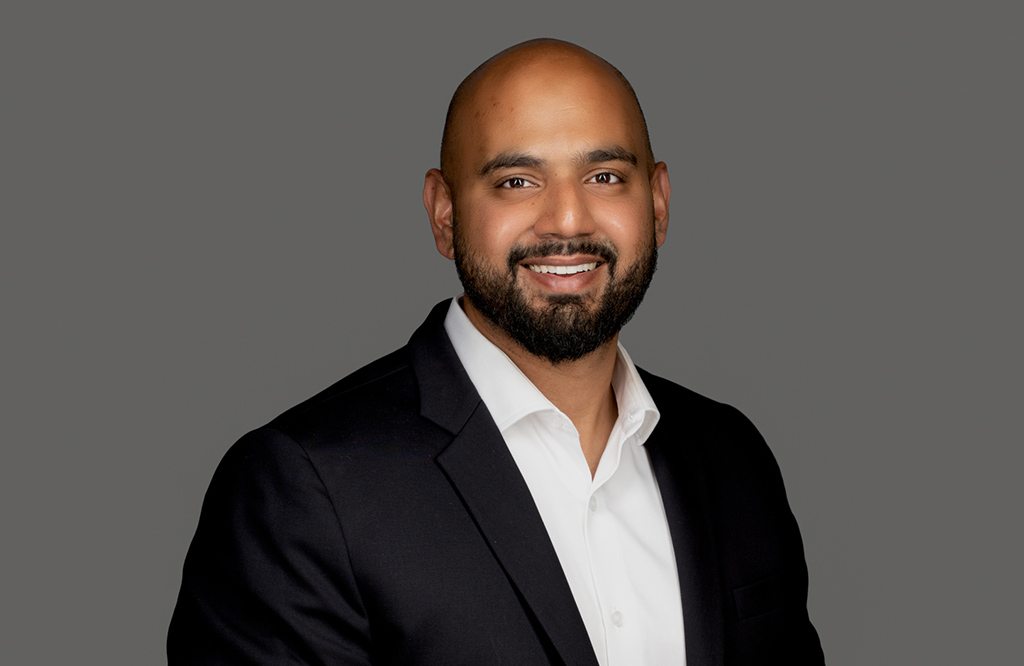The debate around the office versus remote versus hybrid looks set to run and run as employers continue to experiment with different strategies. Despite the enormous advantages of remote working, there are many challenges and gaps with some current approaches that need addressing as we move forward.
So what are the key issues, how do employers address them, and what role should HR technology play? My guest this week is Saad Siddiqui, General Partner at Titanium Ventures, a VC firm with several HR technology investments. Saad has written extensively about the future of work and the advantages of a fluid workforce strategy.
Matt Alder 01:14
Hi there, this is Matt Alder. Welcome to episode 482 of the Recruiting Future podcast. The debate around the Office vs Remote vs Hybrid looks set to run as employers continue to experiment with different strategies.
Despite the enormous advantages of remote working, there are many challenges and gaps with some current approaches that need addressing as we move forward. So, what are the key issues, how do employers address them and what role should HR technology play?
My guest this week is Saad Siddiqui. Saad has written extensively about the future of work and the advantages of a fluid workforce strategy.
Saad Siddiqui 02:18
I am a partner at a venture capital firm called Titanium Ventures. Titanium Ventures is a global venture capital fund where we focus on investing in next -generation technologies. I spend a lot of my time on next -generation HR tech.
We’ve been doing a lot of really good work in everything from helping folks identify the right talent to managing the hiring process to benefits and a bunch of other stuff .
We invested in companies like Forage, which is helping place new grads and interns to two companies. Springboard, which is around training and upscaling existing employees or new employees.
Certain around background checks, spec it around employee onboarding. Especially around sales talent and lively, which is around the healthcare benefits primarily focused in the United States.
Matt Alder 03:38
Really interested in your view on the hiring market in the middle of some very high -profile layoffs in tech, what’s actually happening?
Saad Siddiqui 04:04
Yeah, that’s a really good question, Matt. I think over the last decade, the power has been shifting more to the employee side, particularly in the tech sector. It was incredibly tough for employers to find the right talent and compensation was accelerating at a pretty fast pace.
I’m seeing the market now over the last couple of months, shift dramatically to where we’re seeing a lot of layoffs.
The quitting movement is still there, and also seeing people cut back jobs as well. Job openings are getting reduced within a bunch of different firms.
We’ve gone from a phase of massive growth and trying to identify how to keep culture as your companies are growing to now managing employee morale as you sort of see more layoffs sort of happen in the industry.
Saad Siddiqui 05:30
It’s a really interesting shift over the last couple of months, I guess.
Matt Alder 05:36
What’s happening in the long term because we’ve come out of the pandemic and we’ve seen some fundamental shifts in the way that people work, and how companies think about talent.
Do you think that work has shifted for good despite some of the economic issues that are happening at the moment?
Saad Siddiqui 06:16
We are believers in this concept of the fluid workforce. What fluid workforce means to us is allowing employees to do their best work in the best of circumstances and the situations that fit their lives.
So the nine to five is dead. People are working through how to get their kids ready and stuff and maybe they do a little bit of work before or work a bit earlier, take care of elderly parents and then log back on later on in the evening. That is an example of fluid fluidity that wasn’t there before.
In addition to that, we’ve seen a complete proliferation of where people end up working. There was a massive migration in the US into states like Texas, Florida, and even on a global level, people started migrating to a bunch of different places, more tied to the lifestyle that they were looking for or tied to family connections.
But we’ve also seen a gap that needs to be filled where people come to the office, which is sort of where our role sort of comes in. So we spend some time figuring out what are the pieces that are missing to allow people to do the best work in the way they want to live their lives?
We’ve seen that the younger generation actually wants to go to the office more because if you think about how they meet people, they’re typically in smaller apartments in bigger cities. Not the best place to be if you’re cooped up in a small apartment in New York City, working and living in the same place. On a social basis, they’re able to actually make friends through work.
About 60% or north of 70% of employees actually want some level of remote work based on a McKinsey study. And a PWC study found that people believe that if you’re not in the office, your chances of getting promoted or pay raises are lower if you’re not in the office or have some level of facetime.
That means people still have this desire to kind of build these connections on a person to person basis. We’re trying to remedy that using technology. And mentoring is something that is sort of lagging today, especially as new employees come on board.
Matt Alder 12:10
In many companies, it’s kind of a moral issue in terms of keeping people engaged. What are the best employers doing in terms of building and promoting their culture?
Saad Siddiqui 12:34
Yeah. So I think in some of the best companies there’s a very strong leadership at the top. And a lot of the best cultures are built by companies that are very mission driven.
They’re looking to bring around a change in the world that doesn’t exist today. I think that is one really big driving factor as people are seeing their friends getting laid off.
The companies are better off kind of fulfilling that mission, despite some of the challenges that those companies may be facing. I think that leadership has a much bigger role in setting the culture now than it probably ever has.
Matt Alder 13:56
If we’re talking about the fluid workforce, there’s also an aspect of that in terms of tenure and how people run their careers and really think differently about the whole world of work. What would your advice be to employers in terms of how best to attract and retain the best talent?
Saad Siddiqui 14:23
it is really important to understand the motivations of a new hire or an existing employee. There’s a handful of things that people really care about.
It could be around culture. People want to work with people that they’re friends with and are willing to sacrifice their monetary compensation for a good work environment. The second one to me is around a craft, making sure that people are set up to do the best work possible and becoming incredibly good at what they’re doing.
Some people are really passionate about being the best ML engineer or being the best sales person. That’s something that just really motivates them and just making sure that you’re providing them with capabilities to be their best in their chosen profession.
The third is compensation. People have monetary needs and sometimes they do base their jobs based off of that. The things that really motivate the employees are very critical.
Matt Alder 16:34
Over the last sort of few years, we’ve seen this record level of investment, almost gravity -defying investment in HR technology.
Saad Siddiqui 16:57
We’ve seen a tremendous amount of dollars being invested in HR tech. HR leaders are being inundated by new technology and have to make decisions on what is the thing that delivers the most ROI.
I f something is 10% better or 10% cheaper, that just doesn’t cut it unfortunately anymore. People are looking for a hard ROI. Like how is this solution going to help me improve my workforce?
I think about HR technology and the places it’s having an impact is everything around sourcing talent, everything around selecting talent, onboarding and retention. And then over time, as people transition out of the business, managing those transitions. We’ve seen innovations in all of these segments. And I think using technologies like artificial intelligence, and data analytics, people are getting smarter around each of these segments.
The investment in these areas will continue too, as we are also seeing existing platforms are extending their reach into a lot of these other segments. So that they are the one stop shop for each of these components within the HR stack.
Saad Siddiqui 18:37
So what we’re going to probably start seeing a bit more is either consolidation or people extending their platforms or products into other areas as well. Do we see a new workday over time? Stuff like that, that sort of is really exciting right now in the HR tech space.
Matt Alder 19:05
And how should employers be thinking about technology and how it can help them? I know that there’s a huge amount of confusion out there about the best way forward, about the best technologies to apply to some of the challenges that we’ve been talking about.
Saad Siddiqui 19:27
It’s very hard because every company has its own stage. In some companies, it is going to be really important to understand or manage layoffs.
The second is understanding how to manage remote work. The third could be around assessing how productive their workforce is. I wish I had one solution to sort of solve everyone’s problems.
I think at the end of the day, the thing that rises above everything else is having a clear vision and purpose of what you’re trying to get accomplished and using technology to enhance or accelerate the change or efficiencies that you’re trying to gain. So I think technologies are not necessarily a solution, more like a tool that can be used for a solution.
Matt Alder 20:40
So if we were having this conversation again in two or three years’ time, what would we be talking about?
Saad Siddiqui 21:07
Yeah, I think what we would be talking about is generally recessions take a little bit of time. We’d be sort of coming out of a recession at that point in time. We will be talking about what we’ve solved remote work in different capacities.
Remote or hybrid work. We’ve sort of built systems that allow for collaboration. Having conferencing services is great, but we need to be able to build culture in a remote or hybrid setting and to build infrastructure that allows for people to work not just within a specific time zone, but on a global basis.
Then also making sure that the folks that we hire are the best people for the jobs that we’re looking for is going to be critical.
I think it is really important to understand that the world is finally open where you can find the best talent on a global basis rather than on a geographic basis. If you’re a startup in San Francisco, you can now hire talent in Brazil where we’re seeing a lot of really interesting talent come out from a technology perspective.
I think those are the things that is going to really shape how we think through work over the next coming years and maybe a decade or so.

